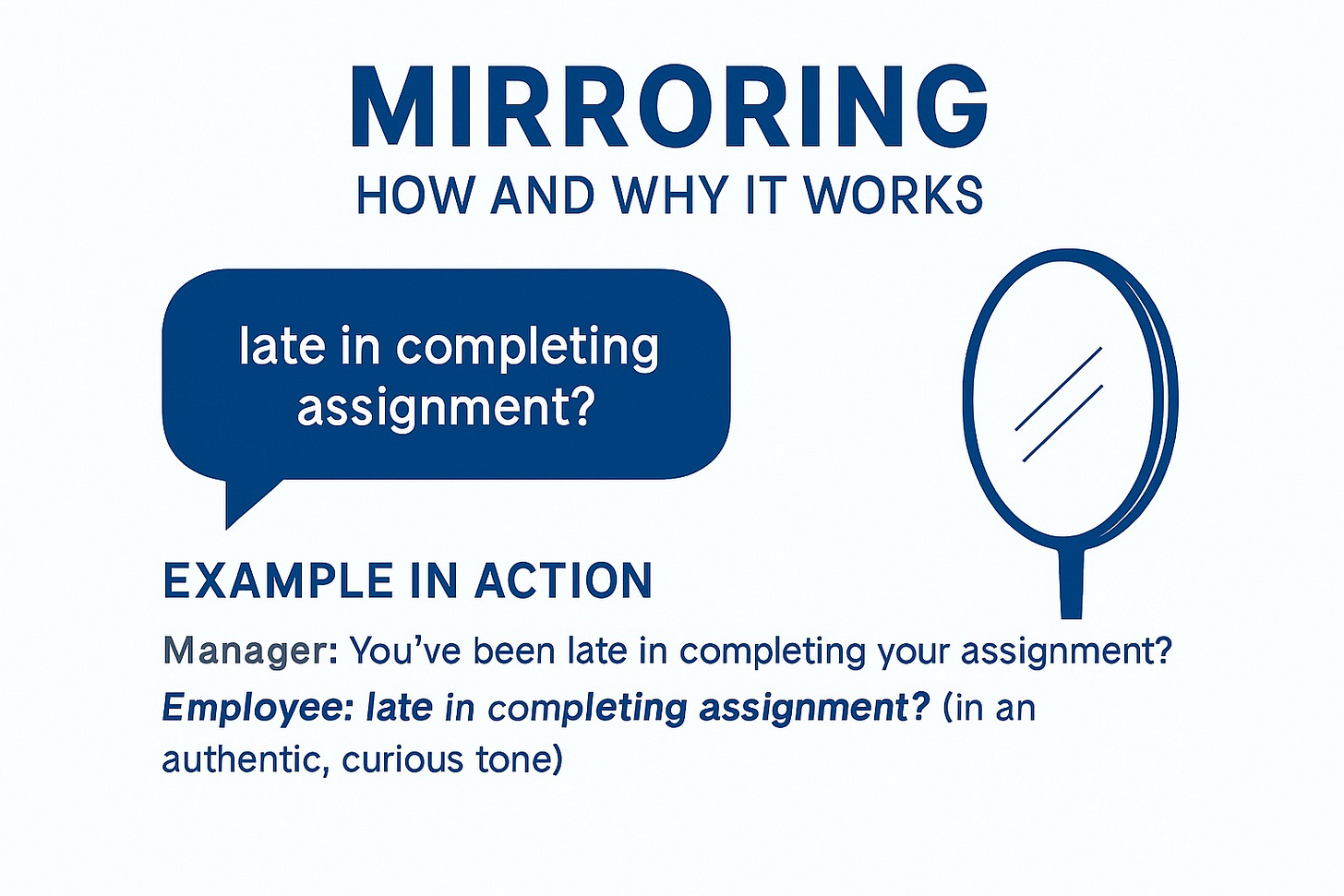Negotiation Series - Learn to mirror to understand additional context
How repeating just a few words can unlock deeper conversations
We’ve all been in conversations where we think we understand the other person, only to later realize we were missing half the context. In my last post, I wrote about Tactical Empathy and why it helps in building trust.
In this post, I want to share another technique that’s deceptively simple but incredibly powerful. It’s called Mirroring.
What is Mirroring
Imagine standing in front of a mirror: you see yourself reflected back.
In negotiations and conversations, mirroring is a similar idea. It’s the art of repeating the last few words (or the critical words) the other person just said and delivered with genuine curiosity.
Done right, it doesn’t sound like a gimmick. It sounds like you’re leaning in, paying attention, and wanting to understand more.
Examples
Here’s a simple workplace scenario:
Manager: You’ve been late in completing your assignment?
Employee: Late in completing the assignment? (in an authentic, curious tone)
Pause. (Yes, let it breathe. Silence is your friend here.)
Manager: Yes, remember we talked the other day; you were supposed to be done with Project A today.
At first glance, this feels like a regular back-and-forth. But look closer. The employee used mirroring i.e. just four words repeated back to prompt the manager to share more context.
That extra detail gives the employee options: agree, explain, or correct the manager’s assumptions.
It’s not about being manipulative. It’s about drawing out information that would otherwise stay unsaid.
Why Mirroring Works
Mirroring is powerful because it triggers a few psychological levers:
People feel heard. Repeating their words signals you’re listening.
It taps into their own train of thought. They naturally expand on what they just said.
It builds rapport. We like people who get us even if it’s through simple reflection.
It slows the conversation down. That small pause often leads to richer, more thoughtful dialogue.
In short: mirroring keeps the spotlight on the other person and that’s exactly where you want it in a negotiation.
How to Practice Mirroring
Like any skill, mirroring feels awkward at first. But with practice, it becomes second nature. A few tips:
Pick the right words. Repeat the critical words that carry emotional weight.
Use a curious tone. If you sound robotic, it won’t land. Have right pause in your curiosity.
Embrace the silence. Don’t rush to fill the pause, let them expand.
Keep it authentic. Mirroring only works if you’re genuinely interested in the other person’s perspective.
My Experience
I once had a project negotiation where the other team insisted on an impossible deadline. Instead of pushing back directly, I mirrored:
Them: We absolutely need this feature by next week.
Me: Next week?
The silence stretched. Then they admitted:
“Well… actually, leadership just wants to see a prototype, not the full rollout.”
That one mirrored phrase unlocked the real ask, completely reframing the negotiation.
Conclusion
Mirroring is one of those skills that looks almost too simple on paper. But in the real world, it’s a conversation unlocker. Use it with authenticity and curiosity, and you’ll find yourself gathering richer context, defusing tension, and building stronger relationships.
Bottom line: Mirroring isn’t about tricking people, it’s about inviting them to share more, so you can negotiate with clarity instead of assumptions.
Next time, if someone comes with confrontational voice, just try softly mirroring them with authentic curiosity. You will get more information and you will be able to gently turn conflict into collaboration.
In my next post, I’ll break down Labeling.
Until then practice, pause, and mirror. You’ll be surprised at what surfaces.
Good luck.


